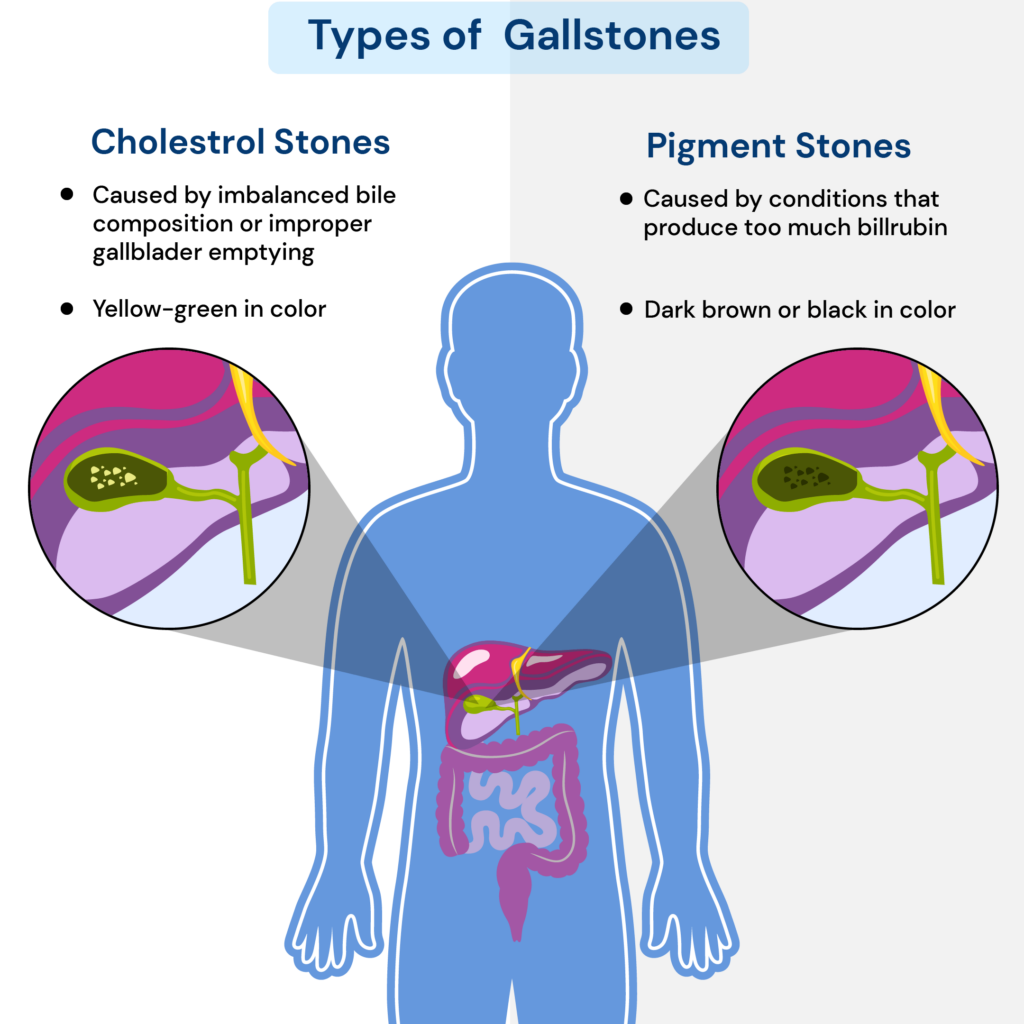Have you ever felt a sudden pain in your upper right abdomen after a particularly stressful period? While many factors can contribute to the formation of gallstones, recent studies suggest that stress could be a potential culprit. This link between stress and gallstones raises critical questions about how our emotions impact physical health. In this article, we'll explore whether stress can cause gallstones, the mechanisms behind this relationship, and what you can do to reduce your risk.
Did You Know? You may carry certain gene changes that increase your risk for various chronic health conditions like diabetes, hypertension, and even gallstones! Learning about them can help you take actionable measures to reduce risk and possibly prevent these health conditions! Learn more:
What Are Gallstones?
Gallstones are hardened deposits typically made out of the digestive fluids that form in the gallbladder.
The gallbladder is a pear-shaped organ just below the liver, towards the right side of your abdomen.
The size of gallstones can range from as small as a grain of sand to as big as a golf ball.
The number of stones can also vary among different people.
The typical course of treatment is gallbladder removal or cholecystectomy. However, if someone doesn’t experience symptoms, they may not require surgery.
Symptoms of Gallstones
Gallstones often do not cause any symptoms, but when they do, they can range from mild to severe. Here are some of the common symptoms of gallstones:
- Abdominal pain: Pain in the upper right or center of the abdomen is a common symptom of gallstones. The pain can be dull, sharp, or crampy and may come and go.
- Nausea and vomiting: Gallstones can cause nausea and vomiting, especially after eating a fatty meal.
- Jaundice: If a gallstone blocks the bile duct, it can cause jaundice and yellowing skin and eyes.
- Clay-colored stools: When the bile flow is blocked, the stools can become pale or clay-colored.
- Fever and chills: If the gallbladder becomes infected, it can cause fever and chills.
- Indigestion: Gallstones can cause indigestion, bloating, and gas.
What Causes Gallstones?
Bile is the digestive fluid present inside the gallbladder. Gallstones are thought to occur when there’s a chemical imbalance in the bile.
However, the reason behind the chemical imbalance is still unclear.
Two things in the bile can contribute to gallstone formation.
- Unusually high levels of cholesterol: Most gallstones are made up of cholesterol. When there is too much cholesterol in the bile, it can form crystals that eventually turn into gallstones.
- Too much bilirubin: Bilirubin is a waste product produced when red blood cells break down. If there is too much bilirubin in the bile, it can contribute to the formation of gallstones. About 1 in 5 gallstones is made of bilirubin.

Risk Factors For Gallstones
The following groups of people are more likely to get gallstones:
- Those aged 40 years and above
- Females or people assigned female at birth
- Those with a family history of gallstones
- Those who are obese
- Those with certain medical conditions like Crohn’s, irritable bowel syndrome, or certain liver diseases
- Those who habitually consume high fat, high cholesterol, and low fiber diet
- Those taking an antibiotic called ceftriaxone
- Those who have lost weight too quickly
Can Stress Cause Gallstones?
When the body is under stress, its energy is diverted from functions like digestion, so it can use all its resources to trigger the "fight-or-flight" response.
Digestion is slowed by lowering the contraction of digestive muscles and decreasing the secretion of digestive juices, like bile.
Chronic stress can result in repeated inhibition of bile release from the gallbladder, disrupting the entire biliary system.
This can increase the bile's cholesterol concentration, leading to gallstones.
Research shows diminished gallbladder emptying observed in patients with cholesterol gallstones.
Thus, chronic stress may lead to gallstone formation by affecting gallbladder emptying or bile secretion from the gallbladder.
Managing Stress For Better Gut Health
While managing stress can help the body in numerous ways, it can particularly result in improved gut health and reduced risk of digestive troubles and gut-associated health conditions.
Here are some effective strategies to manage stress for improved gut health:
- Mindful eating: Mindful eating helps us become more present and aware of our body's needs, which can help reduce stress levels and promote overall well-being.
- Probiotics: Probiotics are beneficial bacteria that live in the gut and help maintain a healthy gut microbiome. They also modulate the gut-brain axis by influencing the production of neurotransmitters (chemical messengers in the brain), such as serotonin and gamma-aminobutyric acid (GABA), which regulate mood and anxiety.
- Exercise: Exercise is a powerful stress reliever that can improve gut health by reducing inflammation and improving gut motility.
- Mind-body practices: Mind-body practices such as yoga, tai chi, and meditation can help reduce stress and promote relaxation, improving gut health.
- Adequate sleep: Getting enough sleep reduces stress and maintains a healthy gut. Lack of sleep can disrupt the gut microbiome, increase inflammation, and worsen gut symptoms.
Overall, managing stress is essential for maintaining a healthy gut. Stress-reducing strategies and healthy lifestyle habits can promote better gut health and overall well-being.
Summary
Gallstones are caused when a chemical imbalance in bile (a digestive juice present in the gallbladder) causes it to crystallize and hardens, resulting in stone-like structures. Factors like a high-fat and high-cholesterol diet, a sedentary lifestyle, and obesity can contribute to gallstone formation. Uncontrolled stress can also result in gallstone formation by affecting gallbladder emptying. When the body is under stress, the energy from digestion goes toward fighting stress. So, digestive juices like bile are not released from the gallbladder. This can eventually lead to a build-up of bile juice with increased cholesterol concentration, leading to gallstone formation.






